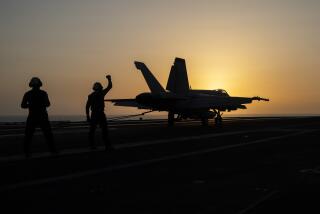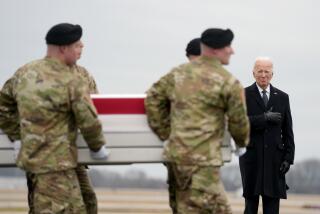U.S.-Iraqi raids net weapons, suspects
baghdad -- Helicopter gunships attacked suspected insurgent hide-outs, and U.S. and Iraqi soldiers staged simultaneous raids across Iraq on Monday as coalition forces unleashed the full force of the American troop buildup.
The U.S.-led commando operations targeted Al Qaeda in Iraq and Shiite Muslim militants by striking at reported safe havens, weapons caches and bomb-building sites here and in other volatile areas throughout the country.
At least 17 suspected insurgent leaders were captured and dozens of improvised explosive devices were seized and disarmed, military officials said.
The operation was touted by U.S. military officials as the culmination of the deployment of an additional 28,500 U.S. troops to Iraq in recent months. It followed a recent coalition offensive aimed at flushing militants from their support zones, disrupting supply lines and capturing or killing “high-value” suspects.
“The intent is to keep the enemy on the run,” said Army Maj. Gen. Rick Lynch, whose Task Force Marne waged strikes on insurgents holed up in the Tigris and Euphrates river valleys.
U.S. officials blame foreign fighters and Shiite militias allegedly aided by Iran for the violence that every month kills nearly 100 American soldiers and thousands of Iraqi troops, police and civilians.
The military said three U.S. soldiers were killed Monday by an explosion near their vehicle in Nineveh province, and a fourth was killed in combat in west Baghdad. The deaths bring to 3,693 the number of American service members killed since the beginning of the war, according to icasualties.org.
Witnesses in Tikrit, Ramadi, Fallouja, Mosul and Samarra reported seeing helicopters sweep over suspected insurgent hide-outs Monday, blasting them with rockets. A senior Iraqi army officer in Fallouja said that 15 insurgents were killed but that at least 60 others escaped.
Police in east Baghdad reported that at least two U.S. convoys hit explosive devices, including a Humvee that was destroyed and its occupants killed or badly injured. The attack could not be independently confirmed.
U.S. military officials said dozens of strategists and financiers were arrested in the raids.
In Samarra, U.S. forces raiding a house failed to find a suspected leader of Al Qaeda in Iraq but arrested his three brothers.
In Karbala, Maj. Gen. Salih Hasoon said his troops managed to arrest an Al Qaeda in Iraq leader who had infiltrated the local police force and paid officers as much as $10,000 to release jailed suspects.
Authorities said at least six civilians died in the air and ground attacks, including a man in Hillah who was shot in the chest after he approached a U.S. convoy.
Despite the U.S.-led crackdown, sectarian attacks continued. Gunmen stopped the car of Sunni tribal leader Sheik Shalan Abdul Karim Issawi in Diyala province, seizing him and a bodyguard. The manager of a refugee charity office in Basra was also kidnapped.
In Baghdad, 18 bullet-riddled bodies, presumed to be of victims of death squads, were found Monday morning.
Meanwhile, Prime Minister Nouri Maliki’s appeal for a crisis conference today to forge national unity appeared to have fallen on deaf ears, with the leading Sunni Arab leader contending that he hadn’t been formally invited and another making what are likely to be seen as unreasonable demands for sharing power with Maliki’s Shiite-dominated government.
Seventeen of the 37 Cabinet posts in Maliki’s government are vacant because of boycotts by ministers to protest various perceived shortcomings of his administration.
Vice President Tariq Hashimi, a moderate Sunni, said he would take part only if all other faction leaders did. Hamid Hais of the Al Anbar Salvation Council, another Sunni Arab faction, said he would participate if Maliki gave his bloc three important Cabinet posts it had been denied. Kurdish, Shiite and Sunni Arab leaders met among themselves, though, to devise strategy for a potential division of power.
In other developments, the Iraqi High Tribunal announced that it would put 15 former loyalists of Saddam Hussein on trial Aug. 21 on charges connected with the suppression of a Shiite uprising in 1991. Included among the defendants is Ali Hassan Majid, also known as Chemical Ali, who has already been sentenced to death in another case.
Times staff writer Zeena Kareem contributed to this report.
More to Read
Sign up for Essential California
The most important California stories and recommendations in your inbox every morning.
You may occasionally receive promotional content from the Los Angeles Times.










